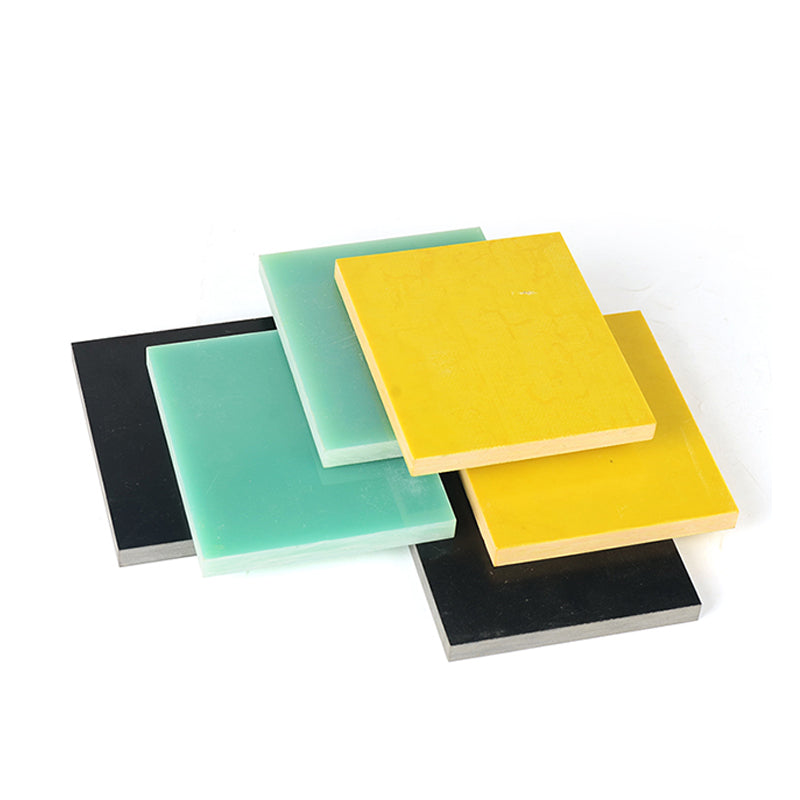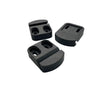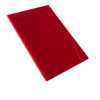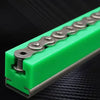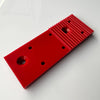Why Bakelite Sheets Are Essential for Electrical Insulation: The Ultimate Guide
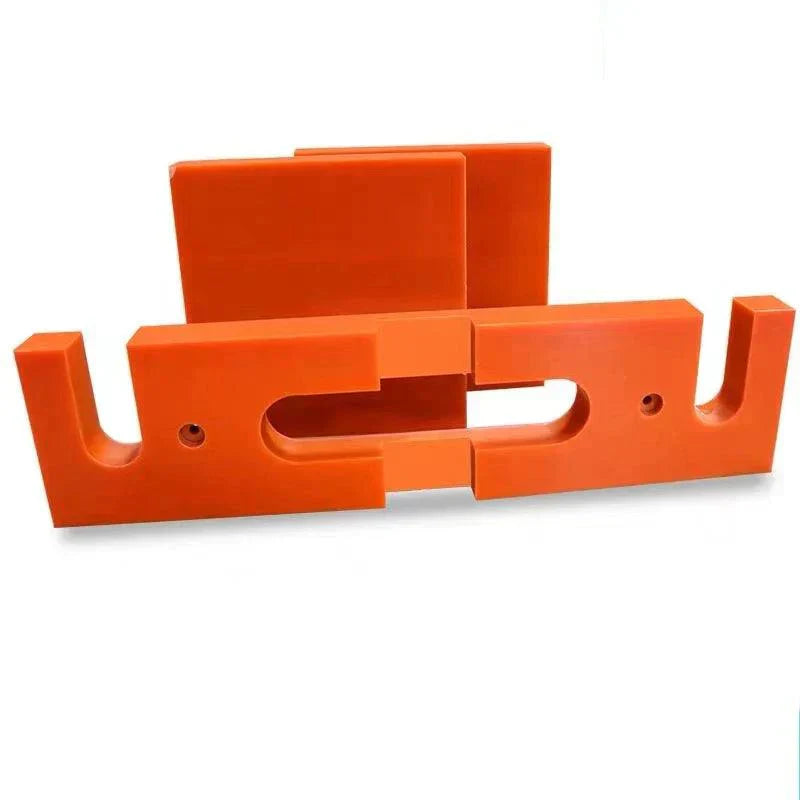
Discover the unmatched benefits of Bakelite sheets in electrical insulation. This comprehensive guide delves into the composition and properties of Bakelite, highlighting its high dielectric strength, thermal stability, and mechanical robustness. Understand why Bakelite is the preferred material for electrical insulation, capable of withstanding high voltages and providing reliable performance in various electrical components like switchboards, circuit boards, transformers, and motor parts.
🎉 Limited Time Offer
Unlock special savings on your next order.

Various thicknesses of Bakelite sheets available strictly for electrical insulation applications.
Explore the versatility of Bakelite as we compare it to other insulating materials such as ceramics and fiberglass, showcasing its cost-effectiveness and superior performance. Learn how to choose the right thickness of Bakelite sheets for different applications, ensuring you get the best results whether for delicate PCBs or heavy-duty industrial use.
This guide also covers maintenance tips to extend the longevity of Bakelite insulators, emphasizing its durability and low maintenance needs, making it a cost-effective solution for long-term applications. Additionally, uncover the innovative uses of Bakelite beyond electrical insulation, including its applications in the automotive industry, aerospace components, and crafting, showcasing its versatility and durability.
Stay informed and make the best choices for your projects with this ultimate guide on why Bakelite sheets are essential for electrical insulation.
Understanding Bakelite: Composition and Properties
The Chemical Structure of Bakelite
Bakelite, known chemically as phenol-formaldehyde resin, stands out as one of the first synthetic polymers, developed by Leo Baekeland in 1907. The material results from a condensation reaction between phenol and formaldehyde, creating a robust, highly cross-linked polymer structure. This intricate chemical composition provides Bakelite with its exceptional thermal stability and rigidity, making it suitable for numerous industrial applications.
High Dielectric Strength
One of the key attributes of Bakelite is its high dielectric strength. This property ensures that Bakelite can withstand high voltages without electrical breakdown, making it an ideal material for electrical insulation. The high dielectric strength of Bakelite protects electrical components from short circuits and enhances the overall safety and reliability of electrical systems. For more on this topic, check out high dielectric strength of Bakelite.

BeePlastic offers custom-cut Phenolic Rods and Sheets.
Thermal Stability
Bakelite exhibits outstanding thermal stability, maintaining its properties even at elevated temperatures. This stability is crucial for applications involving high thermal stress, such as in electrical insulators, circuit boards, and various automotive components. The ability of Bakelite to withstand high temperatures without degrading ensures long-lasting performance and safety in these critical applications. Learn more about thermal stability of Bakelite.
Mechanical Strength
In addition to its electrical and thermal properties, Bakelite is renowned for its mechanical strength. This thermosetting plastic boasts a high strength-to-weight ratio, allowing it to endure significant mechanical stress without deformation. Its rigidity and durability make it an excellent choice for mechanical parts, gears, bearings, and other components that require robust performance under pressure. Explore more about mechanical strength of Bakelite.
Chemical Resistance
Bakelite is also valued for its chemical resistance. It withstands exposure to a variety of chemicals, including acids and bases, without significant degradation. This resistance makes Bakelite suitable for use in harsh chemical environments, adding to its versatility across different industries. For detailed insights, see chemical resistance of Bakelite.
Low Moisture Absorption
Another beneficial property of Bakelite is its low moisture absorption. This characteristic ensures that Bakelite does not swell or lose its insulating properties when exposed to humidity or moisture. This makes it an excellent material for applications in humid or wet conditions, maintaining its structural and functional integrity. Discover more about low moisture absorption of Bakelite.
Versatility in Applications
The unique combination of high dielectric strength, thermal stability, mechanical strength, chemical resistance, and low moisture absorption makes Bakelite an invaluable material in many fields. From electrical insulation to automotive components and industrial machinery, Bakelite's properties cater to a wide range of applications, ensuring reliability and performance in demanding environments. Learn more about the versatile applications of Bakelite.
The Role of Bakelite in Electrical Insulation
Bakelite is widely recognized for its superior electrical insulation properties. The material's high dielectric strength ensures it can withstand significant voltages without breaking down, making it ideal for a range of electrical applications. Bakelite's molecular structure, formed through the polymerization of phenol and formaldehyde, creates a highly cross-linked network that resists electrical currents effectively. This ability to prevent the flow of electricity is crucial for protecting electrical components and ensuring the safety and reliability of electrical systems. Learn more about high dielectric strength in Bakelite.

Resistance to Electrical Currents
One of the standout features of Bakelite is its resistance to electrical currents. This property is essential for materials used in electrical insulation, as it prevents short circuits and reduces the risk of electrical fires. Bakelite's resistance to electrical currents is due to its tightly bound molecular structure, which does not allow free movement of electrons. This makes Bakelite an excellent choice for insulating high-voltage components and systems. For further details, explore electrical current resistance of Bakelite.
Durability Under High Voltage
Bakelite's ability to withstand high voltages without degrading makes it a reliable material for use in electrical insulation. Electrical components that are exposed to high voltages require materials that can endure these conditions without compromising performance. Bakelite's high dielectric strength ensures that it remains stable and effective even under extreme electrical stress. This durability is crucial for applications such as circuit boards, switchgear, and transformers, where reliable insulation is paramount. Check out more about Bakelite’s voltage durability.
Low Moisture Absorption
Another critical factor contributing to Bakelite's effectiveness as an electrical insulator is its low moisture absorption. Electrical insulating materials must maintain their insulating properties even in humid or wet conditions. Bakelite's low moisture absorption means that it does not swell or lose its insulating capabilities when exposed to moisture. This property is especially beneficial in environments where humidity is a concern, ensuring consistent performance and safety. Discover more about low moisture absorption in Bakelite.
Heat Resistance and Stability
Bakelite’s heat resistance further enhances its suitability for electrical insulation. Electrical components often generate heat during operation, and insulating materials must be able to withstand these temperatures without melting or degrading. Bakelite’s thermal stability ensures that it can endure high temperatures, maintaining its structural integrity and insulating properties. This makes it an excellent choice for high-temperature electrical applications, providing reliable insulation and protection. Learn more about Bakelite’s heat resistance.
Versatile Applications in Electrical Systems
The combination of high dielectric strength, resistance to electrical currents, low moisture absorption, and heat resistance makes Bakelite an invaluable material in various electrical insulation applications. It is used in the manufacturing of switchboards, circuit boards, transformers, and motor components, among others. These applications benefit from Bakelite’s robust insulating properties, ensuring the safety and efficiency of electrical systems. Explore the versatile applications of Bakelite in electrical insulation.
By understanding the unique properties and advantages of Bakelite, it becomes clear why this material is essential for electrical insulation. Its ability to withstand high voltages, resist electrical currents, and maintain performance under various conditions makes it a preferred choice for engineers and manufacturers in the electrical industry.
Choose Your Bakelite Solution
Standard Bakelite Sheets
Ready-to-ship orange & black phenolic sheets. Thickness: 1mm - 50mm. No MOQ.
Browse CatalogCustom CNC Machining
Expert manufacturing to your drawings (CAD/PDF). Precision drilling, milling, and turning.
Get a QuoteApplications of Bakelite Sheets in Electrical Components

Switchboards
Bakelite sheets are widely used in the manufacturing of switchboards due to their exceptional electrical insulation properties. Switchboards, which distribute electrical power within a building, require materials that can handle high voltages and prevent electrical shorts. Bakelite's high dielectric strength and thermal stability make it an ideal choice. Its ability to withstand high temperatures ensures that switchboards remain safe and functional even under heavy electrical loads. For more details on this, explore Bakelite’s use in switchboards.
Circuit Boards
Another crucial application of Bakelite sheets is in the production of circuit boards. These boards form the backbone of most electronic devices, providing a platform for mounting and connecting various electronic components. Bakelite circuit boards benefit from the material's rigid structure and excellent insulating properties. This ensures that the electronic circuits remain isolated from external interference, enhancing the performance and reliability of the devices. Learn more about the benefits of Bakelite in circuit boards.
Transformers
Transformers are essential components in electrical systems, used to step up or step down voltage levels. The insulation material within a transformer must withstand high electrical stresses and temperatures. Bakelite sheets provide the perfect solution due to their high dielectric strength and thermal resistance. By using Bakelite, manufacturers can ensure that transformers operate efficiently and safely over long periods. For additional information, see Bakelite’s role in transformers.
Motor Components
In electric motors, various components such as commutator segments, brush holders, and insulating plates are often made from Bakelite. The material's ability to resist electrical currents and endure high mechanical stresses makes it suitable for these applications. Bakelite motor components ensure reliable operation and longevity, even in demanding industrial environments. Discover more about Bakelite in motor components.
Switchgear
Switchgear systems, which control, protect, and isolate electrical equipment, also benefit from the use of Bakelite sheets. These systems handle high power levels and need robust insulating materials to prevent electrical failures. Bakelite switchgear components offer excellent thermal and electrical insulation, ensuring the safety and efficiency of the system. For more insights, explore Bakelite in switchgear systems.
Electrical Insulators
Electrical insulators made from Bakelite are used extensively in various electrical applications. These insulators prevent the unwanted flow of current, protecting both the equipment and users from electrical hazards. Bakelite insulators are particularly valued for their durability and resistance to moisture, making them suitable for both indoor and outdoor applications. Check out more about Bakelite electrical insulators.
Connectors and Terminals
Bakelite sheets are also used in the production of connectors and terminals. These components require materials that can maintain electrical insulation while providing structural support. Bakelite's resistance to electrical currents and its mechanical strength ensure that connectors and terminals remain reliable and safe throughout their use. Learn more about the advantages of Bakelite in connectors and terminals.
By understanding the diverse applications of Bakelite sheets in electrical components, it becomes clear why this material is highly regarded in the electrical industry. Its combination of high dielectric strength, thermal stability, and mechanical robustness makes it an invaluable asset for ensuring the safety and efficiency of electrical systems.
Comparing Bakelite with Other Insulating Materials
Cost-Effectiveness
Bakelite is often favored for its cost-effectiveness compared to other insulating materials. The production process of Bakelite involves relatively inexpensive raw materials, and the manufacturing techniques are well-established, leading to lower production costs. When comparing Bakelite to ceramics, for instance, ceramics can be more expensive due to the complexity of their production process and the cost of raw materials. On the other hand, fiberglass can be cost-competitive with Bakelite, but its handling and installation costs might be higher due to the need for protective measures against its fibrous nature. Learn more about cost-effective insulation materials.
Versatility
The versatility of Bakelite makes it suitable for a wide range of applications. It can be easily molded into various shapes and sizes, which is a significant advantage over materials like ceramics and fiberglass. Ceramics are generally brittle and challenging to shape into complex forms without specialized equipment, limiting their versatility in certain applications. Fiberglass, while flexible and moldable, can pose health risks during handling and installation due to the fine glass fibers. Newer synthetic options, such as polyimides and PEEK, offer excellent versatility but often come at a higher cost, making Bakelite a more affordable alternative for many applications. Explore versatile insulating materials for more information.

Versatile machined Bakelite parts showing complex shapes.
Performance Under Stress
Bakelite performs exceptionally well under various types of stress, including electrical, thermal, and mechanical stress. Its high dielectric strength ensures it can handle high voltages without breaking down, making it ideal for electrical insulation. Additionally, Bakelite's thermal stability allows it to withstand high temperatures, which is crucial for components exposed to heat, such as in electrical transformers and motor parts.
In contrast, ceramics also offer excellent thermal and electrical insulation properties but can be brittle under mechanical stress. They are prone to cracking or shattering when subjected to impact or vibration, which can limit their use in applications requiring high mechanical strength.
Fiberglass, while strong and resistant to heat, can degrade over time when exposed to continuous high temperatures and mechanical vibrations. The fine glass fibers can also pose health hazards during manufacturing and installation.
Newer synthetic materials, like polyimides and PEEK, provide superior performance under stress, offering high dielectric strength, thermal stability, and mechanical robustness. However, these materials are significantly more expensive than Bakelite, making them less accessible for cost-sensitive applications. Check out high-performance insulating materials for more details.
Specific Use Cases
Bakelite's use cases are extensive due to its unique combination of properties. It is commonly used in switchboards, circuit boards, motor components, and transformers. The material's ability to provide reliable insulation while being cost-effective makes it a preferred choice for many electrical applications.
Ceramics are often used in high-temperature applications such as furnace linings and thermal barriers due to their excellent heat resistance. They are also used in high-frequency electronic components where minimal dielectric loss is required.
Fiberglass is widely used in construction and marine applications for its strength and resistance to corrosion. It is also used in electrical applications where lightweight and durable insulation is needed.
Newer synthetic options, such as polyimides and PEEK, are used in aerospace, medical, and high-performance electronic applications where superior performance justifies the higher cost. These materials are selected for their exceptional mechanical strength, thermal stability, and dielectric properties. Discover more about specific use cases for insulating materials.
By comparing Bakelite with ceramics, fiberglass, and newer synthetic materials, it becomes evident that Bakelite offers a balanced combination of cost-effectiveness, versatility, and performance under stress. This makes it an ideal choice for many electrical insulation applications, providing reliable and durable performance while remaining budget-friendly.
Choosing the Right Thickness of Bakelite Sheets for Your Project

Thin Bakelite Sheets (1mm - 3mm)
Thin Bakelite sheets, ranging from 1mm to 3mm in thickness, are ideal for applications requiring precision and flexibility. These sheets are commonly used in printed circuit boards (PCBs) and other delicate electronic components. Their slim profile allows for effective electrical insulation without adding significant bulk, which is crucial for maintaining the compactness and efficiency of electronic devices. The 1mm Bakelite sheets are particularly suited for intricate designs where space constraints are a concern. For more details on their uses, explore thin Bakelite sheets for PCBs.
Medium Thickness Bakelite Sheets (5mm - 10mm)
For projects demanding a balance between mechanical strength and flexibility, medium thickness Bakelite sheets (5mm to 10mm) are an excellent choice. These sheets are robust enough to be used in more demanding electrical applications, such as switchboards, motor components, and electrical insulators. The 5mm Bakelite sheets provide sufficient durability while remaining relatively easy to manipulate, making them suitable for crafting small parts and components that need to maintain a fine balance between strength and flexibility. Check out more about medium thickness Bakelite sheets for electrical components.
Thick Bakelite Sheets (12mm - 20mm)
Thick Bakelite sheets, typically 12mm to 20mm thick, are designed for heavy-duty industrial applications. These sheets offer maximum mechanical strength and thermal resistance, making them ideal for components that must endure significant stress and high temperatures. Applications include industrial machinery parts, structural components, and heavy-duty electrical insulators. The 12mm Bakelite sheets provide the necessary robustness for such applications, ensuring that the components can handle the rigors of industrial use. Learn more about the applications of thick Bakelite sheets in industrial settings.
Very Thick Bakelite Sheets (25mm and Above)
For the most demanding applications, very thick Bakelite sheets (25mm and above) offer unparalleled durability and resistance to mechanical stress. These sheets are used in environments where the material must withstand extreme conditions, such as in high-temperature industrial equipment and heavy structural applications. The thickness of these sheets ensures that they remain stable and perform reliably even under the harshest conditions. Explore the benefits of very thick Bakelite sheets for extreme applications.
Choosing the Right Thickness
When selecting the appropriate thickness of Bakelite sheets for your project, consider the specific requirements of your application. Thin sheets (1mm - 3mm) are perfect for electronic applications where space and precision are critical. Medium thickness sheets (5mm - 10mm) are suitable for electrical components that require a balance of strength and flexibility. Thick sheets (12mm - 20mm) cater to heavy-duty industrial applications, providing the necessary robustness and thermal resistance. For the most extreme conditions, very thick sheets (25mm and above) offer the highest level of durability and performance.
By understanding the unique properties and advantages of each thickness category, you can make informed decisions that ensure the success and longevity of your projects. Whether you're working on delicate electronic components or heavy industrial machinery, selecting the right thickness of Bakelite sheets is crucial for achieving optimal performance and reliability.
Maintenance and Longevity of Bakelite Insulators

Routine Maintenance Practices
Bakelite insulators are known for their durability and low maintenance needs, but implementing routine maintenance practices can significantly extend their lifespan. Regular inspection is crucial to identify any signs of wear or damage early. Look for cracks, discoloration, or surface degradation, as these can indicate potential issues. Cleaning the insulators periodically with a soft cloth and mild detergent helps remove dust and contaminants that could compromise their performance. Avoid using abrasive cleaners or tools that could scratch the surface and reduce the insulator's effectiveness. For more details, see maintenance tips for Bakelite insulators.
Protection from Environmental Factors
To ensure the longevity of Bakelite products, it is essential to protect them from extreme environmental conditions. Direct sunlight can cause Bakelite to discolor and become brittle over time, so it is advisable to store and use Bakelite insulators away from windows or direct UV exposure. Additionally, while Bakelite has low moisture absorption, prolonged exposure to high humidity can still impact its properties. Using Bakelite insulators in controlled environments where temperature and humidity are regulated can help maintain their integrity and performance. Learn more about environmental protection for Bakelite insulators.
Handling and Storage
Proper handling and storage practices are vital for maintaining the durability of Bakelite insulators. When handling Bakelite products, avoid dropping or subjecting them to mechanical shocks, as this can cause cracks or fractures. Store Bakelite insulators in a dry, cool place where they are protected from physical damage and environmental stresses. Use appropriate packaging materials that cushion the insulators and prevent them from coming into contact with abrasive surfaces or substances. Check out handling and storage tips for Bakelite products for more information.
Cost-Effectiveness and Longevity
One of the significant advantages of Bakelite is its cost-effectiveness due to its long-lasting nature and minimal maintenance requirements. Unlike some other materials that require frequent replacement or intensive upkeep, Bakelite's inherent durability reduces the need for constant maintenance and replacement. This long-term reliability translates into cost savings for businesses and industries using Bakelite insulators, making it an economically sound choice. Explore the cost benefits of Bakelite insulators.
Addressing Wear and Tear
Even though Bakelite insulators are highly durable, they can still experience wear and tear over time. To address minor damages, such as small cracks or surface abrasions, specialized repair kits are available that can restore the insulators to their original condition. Regular monitoring and prompt repair of any damage ensure that Bakelite insulators continue to perform effectively. For more information on this, visit repairing Bakelite insulators.
Long-Term Performance
The longevity of Bakelite insulators is a testament to their robust mechanical properties and chemical resistance. Their ability to withstand high temperatures, resist chemical corrosion, and maintain structural integrity under mechanical stress makes them ideal for long-term applications in demanding environments. These properties ensure that Bakelite insulators provide reliable performance over extended periods, contributing to their widespread use in electrical systems and industrial applications. Learn more about the long-term performance of Bakelite insulators.
By following these maintenance practices and understanding the inherent durability of Bakelite, users can maximize the lifespan and effectiveness of their Bakelite insulators. Whether used in electrical systems, industrial machinery, or other applications, Bakelite's low maintenance needs and long-term reliability make it a cost-effective solution for various industries.
Innovative Uses of Bakelite Beyond Electrical Insulation

Automotive Components
Bakelite has found significant applications in the automotive industry due to its high mechanical strength, thermal stability, and wear resistance. It is commonly used in manufacturing brake pads, clutch plates, and distributor caps. These components benefit from Bakelite's ability to withstand high friction and temperatures without degrading. Bakelite brake pads, for instance, provide reliable performance under intense braking conditions, ensuring vehicle safety and longevity. Similarly, clutch plates made from Bakelite maintain their structural integrity and effectiveness even with continuous use. Discover more about Bakelite in automotive components.
Aerospace Applications
In the aerospace industry, Bakelite's lightweight properties and high strength-to-weight ratio make it an ideal material for various applications. It is used in manufacturing aircraft interior panels, insulation parts, and structural components that require high durability and resistance to extreme temperatures. Bakelite's ability to maintain performance under high stress and thermal conditions ensures the safety and efficiency of aerospace components. Aircraft interior panels made from Bakelite are particularly valued for their fire-resistant properties and mechanical robustness. Learn more about Bakelite in aerospace applications.
Crafting and Decorative Items
Beyond industrial applications, Bakelite is also popular in the world of crafting and decorative items. Its ability to be easily molded and colored makes it a favorite material for creating jewelry, buttons, and collectibles. During the early 20th century, Bakelite became a sought-after material for costume jewelry, including bracelets, bangles, and earrings, due to its vibrant colors and durability. Today, vintage Bakelite items are highly prized by collectors and artisans. The material's versatility allows crafters to create intricate and unique designs, making it a staple in the crafting community. Explore more about Bakelite in crafting and decorative items.
Industrial Machinery Parts
Bakelite's durability and resistance to wear make it suitable for industrial machinery parts. It is used in the production of gears, bearings, and bushings that must withstand constant mechanical stress and friction. Bakelite's low moisture absorption and chemical resistance further enhance its suitability for industrial environments. Gears and bearings made from Bakelite ensure smooth and efficient operation of machinery, reducing maintenance needs and downtime. For more insights, see Bakelite in industrial machinery parts.
Musical Instruments
In the realm of musical instruments, Bakelite has been used to create durable and high-quality components such as clarinet mouthpieces and guitar picks. The material's ability to be finely machined and polished allows for the production of precise and smooth surfaces, which are essential for musical performance. Bakelite's resistance to moisture and temperature changes also ensures that these components maintain their shape and functionality over time. Discover more about Bakelite in musical instruments.
Home and Kitchenware
Historically, Bakelite has been used extensively in the production of home and kitchenware items, including utensil handles, radio casings, and telephones. Its heat-resistant properties make it an ideal material for items exposed to high temperatures. Bakelite handles for kitchen utensils provide a comfortable grip and remain cool to the touch, ensuring safety and convenience. The iconic vintage Bakelite radios and telephones are also prized for their durability and aesthetic appeal. Explore more about Bakelite in home and kitchenware.
By exploring these innovative uses of Bakelite, it becomes evident that its versatility and durability extend far beyond electrical insulation. From automotive and aerospace components to crafting and household items, Bakelite continues to be a valuable material in various industries, showcasing its enduring relevance and adaptability.
Common Questions and Answers about Bakelite and BeePlastics Customization
1. What are the main properties of Bakelite that make it suitable for electrical insulation?
Answer: Bakelite is ideal for electrical insulation due to its high dielectric strength, thermal stability, and mechanical robustness. It can withstand high voltages without breaking down, endure high temperatures without degrading, and resist mechanical stress effectively. These properties ensure reliable and safe performance in electrical components.
2. What are some modern applications of Bakelite beyond electrical insulation?
Answer: Beyond electrical insulation, Bakelite is used in automotive components like brake pads and clutch plates, aerospace applications such as aircraft interior panels, crafting and decorative items like jewelry and buttons, industrial machinery parts including gears and bearings, and musical instruments such as clarinet mouthpieces and guitar picks. Its versatility and durability make it valuable in various industries.
3. How does Bakelite compare to other insulating materials like ceramics and fiberglass?
Answer: Compared to ceramics and fiberglass, Bakelite is more cost-effective and versatile. Ceramics offer excellent insulation but can be brittle and expensive. Fiberglass is strong and heat-resistant but can pose handling challenges due to its fibrous nature. Bakelite provides a balance of high dielectric strength, thermal stability, and mechanical strength at a lower cost.
4. What thickness of Bakelite sheets should I choose for my project?
Answer: The appropriate thickness of Bakelite sheets depends on the application. Thin sheets (1mm - 3mm) are suitable for PCBs and delicate electronic components. Medium thickness sheets (5mm - 10mm) are ideal for electrical components like switchboards and motor parts. Thick sheets (12mm - 20mm) cater to heavy-duty industrial applications, while very thick sheets (25mm and above) are used in extreme conditions requiring maximum durability.
5. What maintenance practices are recommended to extend the life of Bakelite insulators?
Answer: To extend the life of Bakelite insulators, perform regular inspections for cracks or discoloration, clean with a soft cloth and mild detergent, and protect them from direct sunlight and high humidity. Proper handling and storage in a dry, cool place are also crucial. Addressing minor damages promptly can further enhance their longevity.
6. Can BeePlastics undertake customizations for Bakelite products?
Answer: Yes, BeePlastics can undertake any customization, including sample customization and batch customization. We can tailor Bakelite products to meet your specific requirements, ensuring you get the best solution for your application.
7. What file formats does BeePlastics accept for customization orders?
Answer: BeePlastics accepts a variety of file formats, including PDF and CAD. This flexibility allows us to work accurately with your design specifications, ensuring the final product meets your expectations.
8. Is there a minimum order quantity (MOQ) for customization at BeePlastics?
Answer: No, there is no minimum order quantity (MOQ) at BeePlastics. We cater to both small and large orders, providing the same level of quality and attention to detail regardless of the order size.
9. How does BeePlastics manage the production cycle for customization orders?
Answer: The production cycle at BeePlastics is carried out according to the amount of orders and the complexity of the process. We communicate the production progress in real-time, keeping you informed at every stage to ensure transparency and timely delivery.
10. Does BeePlastics provide samples for customization orders?
Answer: Yes, BeePlastics supports the provision of samples. The sample is free of charge, but the customer is responsible for the shipping costs. This allows you to evaluate the quality and suitability of the product before placing a larger order.
Conclusion
In exploring the various facets of Bakelite, it becomes evident why this material has remained a staple across numerous industries for over a century. From its unparalleled electrical insulation properties and cost-effectiveness to its versatile applications in automotive, aerospace, and crafting, Bakelite continues to prove its value. BeePlastics' ability to customize Bakelite products to meet specific needs, combined with their commitment to quality and customer satisfaction, further enhances the material's appeal. Whether you need thin sheets for delicate electronics or thick, robust sheets for heavy-duty industrial use, Bakelite offers a reliable, durable solution that meets a wide range of demands. With proper maintenance, Bakelite insulators can provide long-term, cost-effective performance, solidifying their place as a preferred choice for both traditional and innovative applications.

Discover why Bakelite is the top choice for so many industries.
Complete the contact form at the bottom of this page to learn more about how BeePlastics can customize Bakelite products to meet your specific requirements. Click here to browse our extensive range of Bakelite products and get started today!
-
Posted in
Bakelite applications, Bakelite benefits, Bakelite sheets, electrical insulation, electrical safety, electrical systems, insulating materials, performance materials

